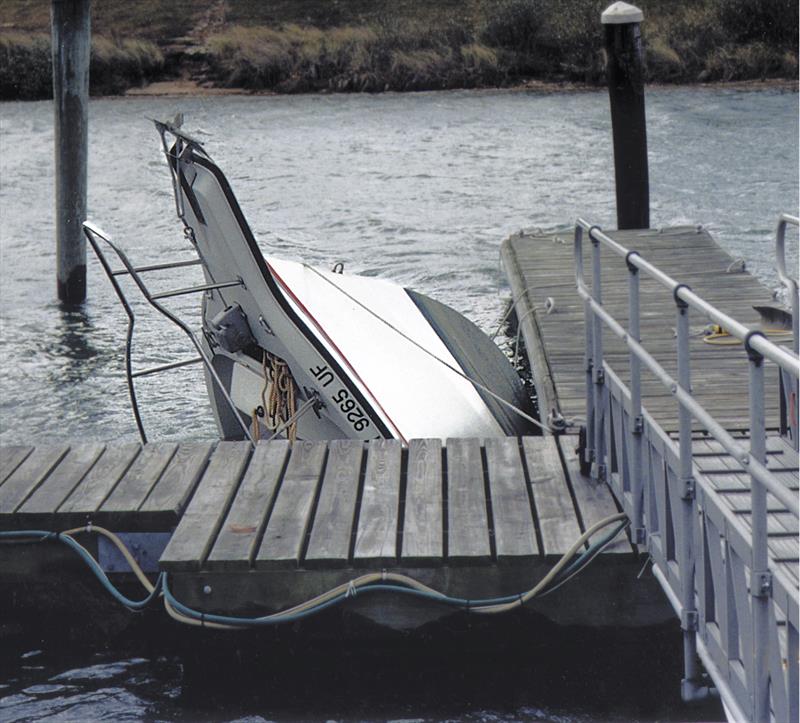
Buying Boat Insurance: The Fine Print
by Scott Croft 26 Mar 2019 06:33 PDT

Does your insurance policy cover this? It all depends on the fine print © Scott Croft
As boat owners prep for the season, it's time to dust off the boat's insurance policy and grab a magnifying glass to read the fine print. Unlike auto or homeowner's insurance, recreational boat insurance has distinct coverages that can perplex boaters and leave them scratching their heads. What do you need to know? Boat Owners Association of The United States (BoatUS) takes a look at the fine print on six of the most important coverages.
The consequential damage fine print: Half of all sinkings occur at the dock when some small part below the waterline fails. However, these parts an outdrive bellows, for example most often fail due to "wear, tear, and corrosion" or a lack of maintenance, so the policy won't pay for a new outdrive bellows. But here's the rub: As a consequence of the failed bellows, your boat has sunk and is likely a total loss. Who pays for that? That's why you need "consequential damage" coverage that pays for losses that often start with a failed part that may be excluded under the policy. The small, inexpensive part that failed may not be covered, but most importantly, the rest of the repairs or total loss will be. One caveat: this consequential damage coverage often applies only to specific types of losses, for example, the immediate consequential damage resulting from any fire, explosion, sinking, demasting, collision or stranding.
The fuel-spill liability fine print: In addition to your policy's standard liability coverage for physical damage or bodily injury to a third party, fuel-spill liability protects you from claims for cleanup or third-party damage due to the accidental discharge of oil or fuel that can occur in a sinking, fire, collision, or grounding. Some policies only pay the costs associated with a fuel spill up to the policy's set limit of boating liability coverage. A better policy separates out fuel-spill liability and provides coverage up to the maximum amount you can be held liable for under federal law, which today is a whopping $939,800.
The on-water towing fine print: Many boat insurance policies offer some kind of on-water towing endorsement that provides a level of towing and assistance for routine breakdowns or soft ungroundings. Know how you will be able to use that coverage: Who provides the service? Does the company have 24-hour dispatch service to call for assistance? Is it easy to summon on-water help? Having an on-water towing endorsement or a stand-alone on-water towing membership plan could allow you to leave your credit card in your wallet, and you'll get priority towboat service.
The salvage coverage fine print: When fires, sinkings, shed-roof collapses, or running up on a shoal damages your boat, you end up with a "salvage" situation. If the boat is not a total loss and needs to be recovered and brought to a repair facility, costs can escalate quickly. Most boaters assume the cost of raising or moving the boat to a safe location is covered by their policy, but some marine insurers will subtract salvage costs from the insured value of the boat, reducing the funds available to repair the boat or the amount paid in the event of a total loss. Also, in case of a total loss, you'll receive a check for the boat's insured value, but to pay for salvage you may only have a small percentage, perhaps just 5 or 10 percent of the insured value, to pay for recovering the boat which may not cover the salvage bill. That leaves your wallet short and you managing a potentially complex task. Better policies don't let you go it alone and provide salvage coverage that is separate but equal to the boat's hull value coverage.
The boat trailer fine print: Not all boat insurance policies automatically provide boat trailer coverage, so be sure to check. Also find out if there are geographic limits on where you may trailer the boat. Note that if you have an accident while towing, it is your boat policy that pays to repair or replace the trailer, but any third-party damage your trailer causes to property or injuries to people is covered under your auto policy.
The liability-only boat policy fine print: If you opt for a liability-only policy, make sure that it provides not only coverage for property damage and bodily injury to others but also coverage for salvage and removal of the wreck, and that separate coverage is available for fuel-spill incidents.
Need some help? The marine insurance specialists at BoatUS can help you review your current policy by calling 800-283-2883 and also offers free quotes at BoatUS.com/Insurance.